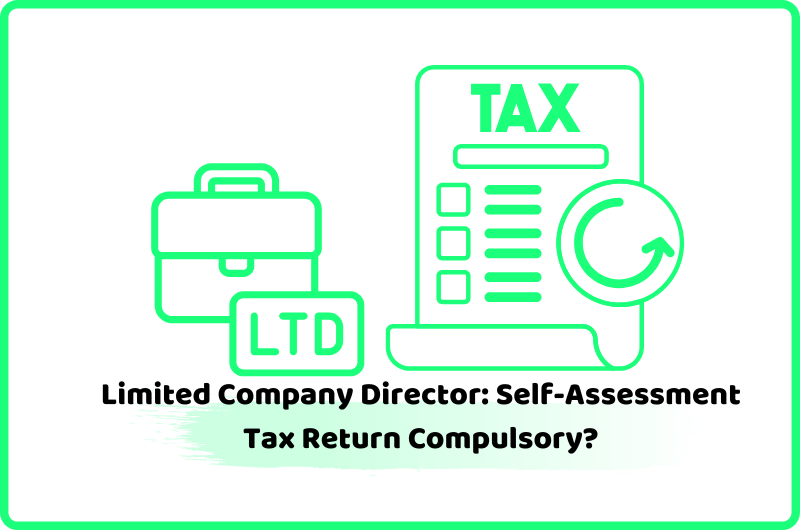Limited Company Director: Self-Assessment Tax Return Compulsory?
For running a limited company in the UK with responsibilities, one of the most important tasks is filing your company director self-assessment tax return. Many directors are confused about whether this process is mandatory or if they can avoid it. In this blog, we will explain to you everything that you need to know about the company director self assessment, including who needs to fill out this tax return, why it is important, and how to complete it in a very easy way.
What is a Self-Assessment Tax Return?
A Self-assessment tax return serves the details to inform HM Revenue & Customs (HMRC) about an individual’s income data. Most people use Self Assessment Tax Returns when they run their own businesses or earn money indirectly through property rentals or investment dividends. Company directors submit this document to report all their sources of revenue, including wages, dividends, and non-taxable payments.
Do Company Directors Need to File a Self-Assessment?
In most cases, yes! Most company directors need to submit their self-assessment tax return to HMRC annually. HMRC requires every director to provide a self-assessment tax return since directors typically receive additional payments like dividends in addition to their salary. You must file even if your business runs at a loss.
However, HMRC exempts certain directors from tax return filing when any of these conditions apply:
- They receive all their earnings solely through PAYE (Pay As You Earn) with no additional income.
- They do not receive dividends or any other taxable income.
- Their only source of taxable income is their salary, and they have no other tax obligations.
The best practice for assessing this situation involves consulting HMRC or qualified tax professionals.
Why Is the Important for Company Director Self Assessment?
Through the company director self assessment tax return, HMRC monitors all taxable income to validate proper tax payments from directors. Here’s why it matters:
- Declaring Dividends: Directors can receive their payment through dividends instead of salary income but face different taxation standards.
- Additional Income: Report all earnings from property and investments and additional business revenue to HMRC.
- Avoiding Penalties: Submission delays in your company director self-assessment will lead to penalties and interest expenses from HMRC.
The proper completion of your tax return keeps you in compliance with tax regulations to stay out of trouble.
How to Complete the Self-Assessment Tax Return?
The filling of your company director self-assessment is very simple if you follow these steps:
- Register with HMRC: If it’s your first time, you just need to register yourself for self-assessment and get a Unique Taxpayer Reference(UTR).
- Keep records: You need to collect all your records of income, including salary, dividends, and other additional income.
- Log in to HMRC: Use the HMRC’s online portal to fulfil your tax return.
- Submit before the deadline: The deadline for online submission is 31st January each year. You must do your submission on time to avoid the penalties.
What Happens If You Don’t File Your Tax Return?
The failed submission of your company director self assessment before the deadline to HMRC will result in penalties.
Late Filing Penalties: When Tax Returns come late, HMRC imposes a first penalty of £100. When late tax returns continue, you receive multiple penalty fees and interest increases.
Interest on Unpaid Taxes: You will need to pay additional interest that builds up daily until your tax bill receives full payment.
Legal Action: When you disobey tax law requirements, then HMRC can start legal proceedings, which may include tax fines and criminal prosecution for tax evasion.
You should file early while maintaining records since this protects against tax-related difficulties.
Seeking Professional Help
If you are confused about your tax requirements. For this, the good idea is to consult a tax professional team. They can help you determine whether you need to file and what information you need to provide to fulfil your tax return. Don’t worry; our team is here to collect important information for the company director self assessment tax return. Additionally, they can help you to optimise your tax situation, ensuring you pay the right amount of tax and avoid unnecessary penalties.
Conclusion
Limited company directors must fulfil their duty by properly filing company director self assessment tax returns based on tax schedule deadlines. Observing this practice will help companies maintain HMRC rules and avoid regulatory penalties. Most director positions require filing status even though not all directors need to file. Directors who receive dividends or extra income must always file. You may face both financial penalties and interest fees when HMRC discovers your late filing, which will quickly accumulate.
Get in touch with our young, clever, and tech-driven professionals if you want to choose the solution to tax burden or accounting problems in the UK for your income. We will ensure to offer the best services.


